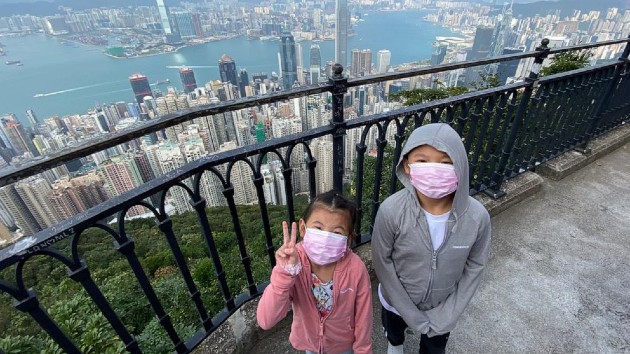By Meredith Deliso and Zoe Magee, ABC News
(NEW YORK) — More than a year into the coronavirus pandemic, children the world over have adapted to a new normal that often has meant wearing masks in public, connecting with family, friends and classmates remotely and spending more time at home.
It’s been a year not without struggles and concerns. The long-lasting impact of the pandemic will take time to fully understand, though already, the mental health toll is clear. From mid-March to October last year, mental health-related visits to United States emergency departments by children ages 12 to 17 increased 31% compared to the same period last year, according to the Centers for Disease Control and Prevention. That increase was 24% for children ages 5 to 11.
Children tend to have mild cases of COVID-19, though some have gotten seriously ill and died from the virus. Multisystem inflammatory syndrome in children (MIS-C), is also a rare but serious illness linked to COVID-19 that has led to child hospitalizations.
They may have also experienced loss due to the virus within their family. There have been more than 2.8 million COVID-19 deaths globally, according to Johns Hopkins University.
The pandemic is also disrupting learning and skills retention, after schools pivoted to remote learning.
The response to the pandemic has varied greatly over the past year by country and region, amid waves of outbreaks. ABC News asked dozens of children from countries around the world how COVID-19 has affected them. For many, the social impact is front of mind.
Leo, 9, of Rome, said he missed seeing his friends’ faces the most.
“I can only see them with the mask,” he said.
“I miss actually getting to see my friends in person,” said Sunzala, 10, of Islamabad, Pakistan, who also missed seeing her teacher. “While I’m talking with my teacher, I usually like to actually see her, but then in online class, her picture would sometimes get all blurry.”
Edward, 11, of Metro Manila, Philippines, also spoke to changes in school.
“I can’t do activities at school and I can’t hug my classmates,” he said.
Other children said they missed doing some of their favorite activities, like traveling with their family or sports.
“I could not surf. It was very annoying,” Heloisa, 7, of Rio de Janeiro, said. “I love surfing so much.”
Brazil is one of the countries hardest-hit by COVID-19, recently becoming the second to surpass 300,000 deaths due to the virus, after the United States.
Heloisa also said she was scared during the pandemic “because the coronavirus is very dangerous,” a fear echoed by other children.
“People was getting sick all because of coronavirus and I was super scared,” Silas, 7, of Centurion, South Africa, said.
One of several COVID-19 “variants of concern,” which are believed to be more transmissible than the original virus strain, was first discovered in South Africa.
At the same time, children were able to find positives in this challenging year. For many, that meant more time with family.
“I liked how my family could get more close since we were all stuck at home,” Emily, 11, of Seoul, South Korea, said. “I was able to play with my sister more.”
“The good things are I can hug my family,” Kayla, 5, of Hong Kong, said.
Children enjoyed being able to spend time on their indoor hobbies.
“I’m happy that I get to stay home and play my video games,” Wesley, 7, of Hong Kong, said.
“I loved dragging my car on the table,” Unai, 3, of Madrid, said.
Others also found the upsides in Zoom school.
“Something I liked about the pandemic is sleeping later, playing with my baby brother … and doing online classes,” Davin, 8, of Seoul, said.
Waamnoor, 10, of Islamabad, Pakistan, said, “I like that you could stay at home and do school in your pajamas.”
Copyright © 2021, ABC Audio. All rights reserved.












